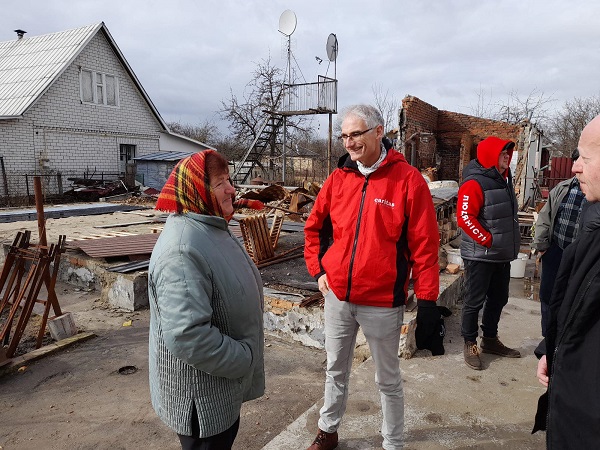 Dr Michael Feit (R), Head of International Cooperation at Caritas Luxembourg, pictured next to a woman in Ukraine;
Credit: Caritas Luxembourg
Dr Michael Feit (R), Head of International Cooperation at Caritas Luxembourg, pictured next to a woman in Ukraine;
Credit: Caritas Luxembourg
In the context of the ongoing conflict in Ukraine and escalating violence in the Middle East (and numerous other crises around the world), Chronicle.lu recently reached out to Luxembourg-based non-profit and non-governmental organisations to learn about their current priorities and responses.
In recent weeks and months, international news headlines have shifted from one crisis to another, from wars to natural disasters. Whilst the conflict in Ukraine continues to drag on, the focus shifted recently towards the "fresher" news of renewed / escalating violence in the Middle East, following the Hamas terrorist attacks on Israel and the latter's response. Earlier in the year, there were the deadly earthquakes in Turkey and Syria, and later in Afghanistan, and the deadly floods in Libya, as well as the ongoing food crisis across Africa.
In this context, Dr Michael Feit, Head of International Cooperation at Caritas Luxembourg, noted that there are emergencies every year and "we have had a lot in the last year". When asked whether support for Ukraine has remained stable over time or if there has been a shift recently towards supporting those in need in the Middle East, Dr Feit explained that Caritas Luxembourg, as a small organisation within the larger Caritas network, focuses its efforts on areas where it can "have the biggest impact". "[We] can't be everywhere," he added. This year's main target countries were thus Ukraine (in response to the ongoing war) and Turkey and Syria (in response to the earthquakes), i.e. in regions where Caritas Luxembourg is already quite active.
The American Caritas organisation remains active in Palestine, Dr Feit noted, although access to Gaza is extremely limited and the needs are "huge". For its part, Caritas Luxembourg is teaming up with fellow German-speaking Caritas organisations (in Germany, Austria and Switzerland) to work on a project aimed at meeting the humanitarian needs of Palestinian civilians. Dr Feit noted that the Luxembourg Government recently approved Caritas Luxembourg's request for €100,000 which will go towards this upcoming project. The main goal will be to provide the most vulnerable with water, food and hygiene kits. With limited access to Gaza, Caritas Luxembourg is exploring the possibilities of working in the West Bank, supporting the people taking shelter there. Before this can happen, however, the partner organisations have to finalise the procedures needed to ensure there is no terrorist financing, i.e. that "the money is going where it should go". Dr Feit reiterated Caritas Luxembourg's condemnation of Hamas' terrorist attacks and noted that the subject is quite political but recalled that its priority is supporting the most vulnerable, who are currently Palestinian civilians.
Regardless of the location or nature of the crisis, however, public interest and donations are waning. Dr Feit explained that very few people are donating at present, whether it is for the conflict in Ukraine, the earthquakes in Turkey or the floods in Libya. "People are very tired of giving," he acknowledged. Similarly, the recent appeal for donations to support Palestinian civilians amid a worsening humanitarian crisis has attracted very little public interest to date. Nevertheless, Caritas Luxembourg can reply on continued support from the European Union and Luxembourg's Ministry of Foreign and European Affairs. "We have sufficient funds to continue our work", for example for long-term projects in Ukraine, Turkey and Syria, he assured.
In Ukraine, Caritas Luxembourg's current priorities focus on preparing the country for winter - and possible Russian attacks on infrastructure during this period. The organisation has purchased firewood and is carrying out "light reconstruction" works, for example repairing the roofs and windows of damaged but still inhabited houses to make them more suitable for winter. For such projects, Caritas Luxembourg is working together with the local Caritas' technical teams who carry out the works, under the former's management and supervision in Ukraine.
For further information about Caritas Luxembourg's ongoing projects (at home and abroad) and to make a donation, visit https://www.caritas.lu/.








